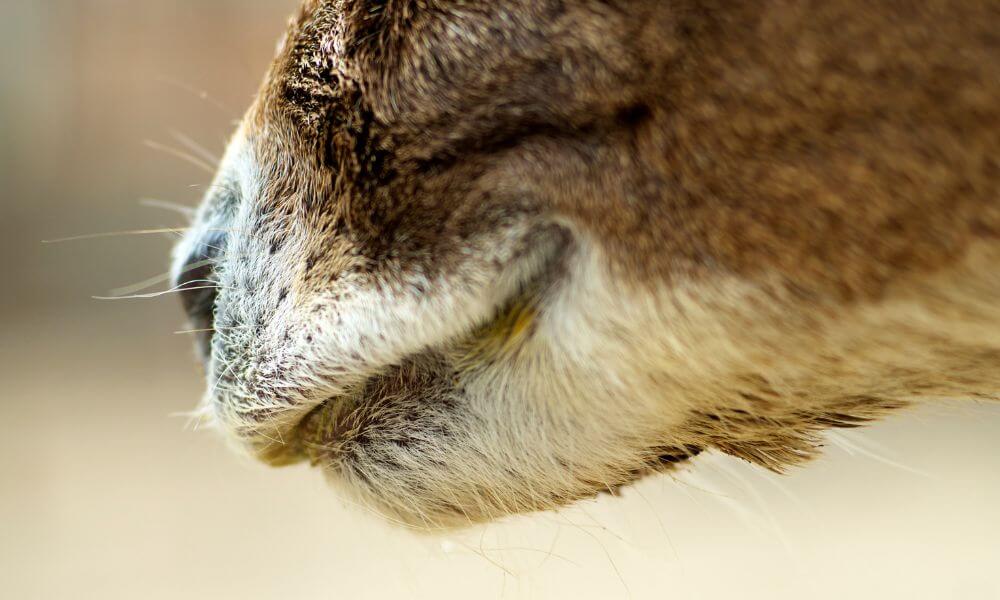Keeping close tabs on your goat’s health is one of the most important things about being a goat owner.
There are a lot of common signs of illness that you need to be constantly vigilant for.
Among the many, one of the most common is foaming at the mouth.
It can be difficult to know what to do when you notice this, so why is your goat foaming at the mouth?
While frothy bloat is the most common cause, there are several others which are much harder to identify with veterinary training.
If you’re worried your goat is ill—which it almost certainly is if it is frothing—then you should always speak to a vet first.
Let’s find out more.

What causes frothy mouth in goats?
There are a few potential causes, but the most common is what’s known as frothy bloat.
Bloat is a common ailment for goats and is caused by a variety of issues.
Related Post: Goat Bloat (What To Look For And How To Treat It!)
It is often caused by the goat eating an excessive amount of a food that they aren’t accustomed to.
For example, rich legumes like alfalfa and clovers can be problematic, because your goat may eat too much before realizing it.
This can also occur with vegetables, cereals, and even highly rich grass.
So, overeating is really the most common cause of bloat.
High grain diets can be another issue.
Other, less common causes of frothy mouth and bloat in goats are organophosphate poisoning, usually accompanied by other signs like vomiting, diarrhea, and increased bronchial secretions.
So while the diet is most commonly the problem, it’s also difficult to know for sure without training.
This is why it’s always best to speak to a vet if you notice any of these symptoms.
So, the next step—how do you treat it?
How do you treat frothy mouth in goats?
There are a couple of things you can do to treat your goat’s frothy mouth.
Again, though, I do want to stress that the best thing you can do in any situation is to call a vet.
You can never be sure what kind of timeline you are operating on.
As I said, froth and bloat can be fatal for goats, so speaking to a vet will help you be sure of what you’re doing.
But there are things you can do to help your goat along.
For only mild cases, you can just add chaff or hay to the feed, and this will reduce bloating.
You can also spread vegetable oils on surfaces where they can lick it off.
This can act as an antifoaming agent.
You can also administer anti foaming agents directly, either by oral drenching or, in serious cases, via a large needle directly into the rumen.
If you aren’t sure of how to do this, do not try and do it without help present—this could go seriously wrong. Again, speak to a vet—they will tell you if it’s the best course of action and administer it for you.
How do you treat goat bloat?
For goat bloat as a wider issue, the treatments are largely the same since the causes and symptoms usually go hand in hand.
You’ll want some sort of anti-bloating agent—home remedies made of olive oil can work really well in mild cases, again.
You can also stop it at the source, too.
Keep your goats on a diet of hay and regulate the nutrients in their pasture.
As I said, the most common causes of goat bloat and frothy mouth are legume-heavy diets, especially when the goat is introduced to these foods newly.
They will overeat, and this will cause bloat.
Further, any treats that you give them, like fresh vegetables, should be carefully moderated.
Nutrient-rich foods like this can cause serious issues if overeaten and are another common cause of goat bloat.
Another important question we haven’t quite touched on is how to actually identify bloat in the first place.
How can you tell if your goat has bloat?
Well, one of the first signs is going to be frothing at the mouth.
Their rumen is frothing because it is over nourished and full, so this will quickly end up back in their mouth.
But the simplest sign is looking at their rumen and seeing it is swollen and expanded.
It will also be very hard to the touch. If you see this, then they are definitely suffering from bloat.
And it’s not like when we get it—they can’t just walk it off!
But you may notice fatigue, vomiting, diarrhea, and general signs of discomfort that indicate they are bloated.
So, while goat bloat is the most common cause and can usually be treated with home remedies, you always want to be safe and not sorry.
Speak to a vet at the first sign of foaming at the mouth, so you can be sure of what you are dealing with.
While you are waiting for the vet, do your best to determine what the cause of the illness is, and apply minor treatments to keep them comfortable.
